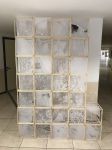
VOCATIONAL SCHOOL
Department of Interior Design (Turkish)
MMVD 226 | Course Introduction and Application Information
| Course Name |
Introduction to Cost Accounting
|
|
Code
|
Semester
|
Theory
(hour/week) |
Application/Lab
(hour/week) |
Local Credits
|
ECTS
|
|
MMVD 226
|
Spring
|
3
|
0
|
3
|
4
|
| Prerequisites |
None
|
|||||
| Course Language |
Turkish
|
|||||
| Course Type |
Required
|
|||||
| Course Level |
Short Cycle
|
|||||
| Mode of Delivery | - | |||||
| Teaching Methods and Techniques of the Course | Problem SolvingLecture / Presentation | |||||
| Course Coordinator | - | |||||
| Course Lecturer(s) | ||||||
| Assistant(s) | - | |||||
| Course Objectives | This course aims to teach students the basic principles and concepts of cost calculations. |
| Learning Outcomes |
The students who succeeded in this course;
|
| Course Description | This course includes cost concept in production, expenditure-expense-cost relationships, costs of production cost and costing methods |
|
|
Core Courses | |
| Major Area Courses | ||
| Supportive Courses | ||
| Media and Management Skills Courses | ||
| Transferable Skill Courses |
WEEKLY SUBJECTS AND RELATED PREPARATION STUDIES
| Week | Subjects | Related Preparation |
| 1 | Introduction to Cost Accounting, Basic Concepts of Cost Accounting | Yönetim Açısından Maliyet Muhasebesi (Cost Accounting from a Management Perspective), Prof. Dr. Süleyman Yükçü, 2014, ISBN: 978 975 6146 74 3. Page: 41-82. |
| 2 | Cost Behavior | Yönetim Açısından Maliyet Muhasebesi (Cost Accounting from a Management Perspective),, Prof. Dr. Süleyman Yükçü, 2014, ISBN: 978 975 6146 74 3. Page: 83-96. |
| 3 | Profit and Loss Statement | Yönetim Açısından Maliyet Muhasebesi (Cost Accounting from a Management Perspective),, Prof. Dr. Süleyman Yükçü, 2014, ISBN: 978 975 6146 74 3. Page: 97-102. |
| 4 | Direct Material, Direct Labor, General Production Costs | Yönetim Açısından Maliyet Muhasebesi (Cost Accounting from a Management Perspective),, Prof. Dr. Süleyman Yükçü, 2014, ISBN: 978 975 6146 74 3. Page: 122-138. |
| 5 | Direct Material, Direct Labor, General Production Costs | Yönetim Açısından Maliyet Muhasebesi (Cost Accounting from a Management Perspective),, Prof. Dr. Süleyman Yükçü, 2014, ISBN: 978 975 6146 74 3. Page: 122-138. |
| 6 | Cost Locations and Cost Allocation | Yönetim Açısından Maliyet Muhasebesi (Cost Accounting from a Management Perspective),, Prof. Dr. Süleyman Yükçü, 2014, ISBN: 978 975 6146 74 3. Page: 149-187. |
| 7 | Cost Locations and Cost Allocations | Yönetim Açısından Maliyet Muhasebesi (Cost Accounting from a Management Perspective),, Prof. Dr. Süleyman Yükçü, 2014, ISBN: 978 975 6146 74 3. Page: 149-187 |
| 8 | Midterm | - |
| 9 | Order Cost System | Yönetim Açısından Maliyet Muhasebesi (Cost Accounting from a Management Perspective),, Prof. Dr. Süleyman Yükçü, 2014, ISBN: 978 975 6146 74 3. Page: 413-450. |
| 10 | Order Cost System | Yönetim Açısından Maliyet Muhasebesi (Cost Accounting from a Management Perspective),, Prof. Dr. Süleyman Yükçü, 2014, ISBN: 978 975 6146 74 3. Page: 413-450. |
| 11 | Phase Cost System | Yönetim Açısından Maliyet Muhasebesi (Cost Accounting from a Management Perspective),, Prof. Dr. Süleyman Yükçü, 2014, ISBN: 978 975 6146 74 3. Page: 483-489. |
| 12 | Phase Cost System | Yönetim Açısından Maliyet Muhasebesi (Cost Accounting from a Management Perspective),, Prof. Dr. Süleyman Yükçü, 2014, ISBN: 978 975 6146 74 3. Page: 491-524. |
| 13 | Traditional Costing | Yönetim Açısından Maliyet Muhasebesi (Cost Accounting from a Management Perspective),, Prof. Dr. Süleyman Yükçü, 2014, ISBN: 978 975 6146 74 3. Page: 525-538. |
| 14 | Activity Based Costing | Yönetim Açısından Maliyet Muhasebesi (Cost Accounting from a Management Perspective),, Prof. Dr. Süleyman Yükçü, 2014, ISBN: 978 975 6146 74 3. Page: 635-670. |
| 15 | Review of semester | |
| 16 | Final Exam |
| Course Notes/Textbooks | Prof.Dr. Süleyman Yükçü, Yönetim Açısından Maliyet Muhasebesi (Cost Accounting from a Management Perspective),, 2014, ISBN: 978 975 6146 74 3. |
| Suggested Readings/Materials | Lecturer’s notes |
EVALUATION SYSTEM
| Semester Activities | Number | Weigthing |
| Participation |
1
|
10
|
| Laboratory / Application | ||
| Field Work | ||
| Quizzes / Studio Critiques | ||
| Portfolio | ||
| Homework / Assignments | ||
| Presentation / Jury | ||
| Project | ||
| Seminar / Workshop | ||
| Oral Exams | ||
| Midterm |
1
|
40
|
| Final Exam |
1
|
50
|
| Total |
| Weighting of Semester Activities on the Final Grade |
2
|
50
|
| Weighting of End-of-Semester Activities on the Final Grade |
1
|
50
|
| Total |
ECTS / WORKLOAD TABLE
| Semester Activities | Number | Duration (Hours) | Workload |
|---|---|---|---|
| Theoretical Course Hours (Including exam week: 16 x total hours) |
16
|
3
|
48
|
| Laboratory / Application Hours (Including exam week: '.16.' x total hours) |
16
|
0
|
|
| Study Hours Out of Class |
16
|
2
|
32
|
| Field Work |
0
|
||
| Quizzes / Studio Critiques |
0
|
||
| Portfolio |
0
|
||
| Homework / Assignments |
0
|
||
| Presentation / Jury |
0
|
||
| Project |
0
|
||
| Seminar / Workshop |
0
|
||
| Oral Exam |
0
|
||
| Midterms |
1
|
17
|
17
|
| Final Exam |
1
|
23
|
23
|
| Total |
120
|
COURSE LEARNING OUTCOMES AND PROGRAM QUALIFICATIONS RELATIONSHIP
|
#
|
Program Competencies/Outcomes |
* Contribution Level
|
||||
|
1
|
2
|
3
|
4
|
5
|
||
| 1 | Will be able to have knowledge about the basic technical information of the interior design, methods and tools. |
X | ||||
| 2 | Will be able to use and interpret technical and procedural knowledge about the interior design in application and will be able to express suggestions for solutions to problems orally and in written. |
X | ||||
| 3 | Will be able to create a strategy by recognizing the market conditions and analyzing revenue management. |
|||||
| 4 | Will be able to have knowledge about legislation, fundamental values and principles in the field of interior design related to industry. |
|||||
| 5 | Will be able to think creative and innovative and apply the knowledge in an occasion different than the customary applications with an innovative way of thinking. |
|||||
| 6 | Will be able to take responsibility as an individual and a team member, will be able to be open-minded, constructive, confident, open to criticism and will be able to work effectively and efficiently. |
|||||
| 7 | Will be able to internalize the need to obey the values of business ethics and will be able to have and apply the social, scientific and ethical values in the stages of the collection of data, interpretation, dissemination and implementation. |
X | ||||
| 8 | Will be able to communicate with colleagues and follow the knowledge in the interior design field by using a foreign language. |
|||||
| 9 | Will be able to use informatics and communication technologies with computer programs in a level that required by the interior design field. |
|||||
| 10 | Will be able to adopt a lifelong learning approach, and will be able to do studies for renewing and improving their knowledge continuously. |
|||||
*1 Lowest, 2 Low, 3 Average, 4 High, 5 Highest



